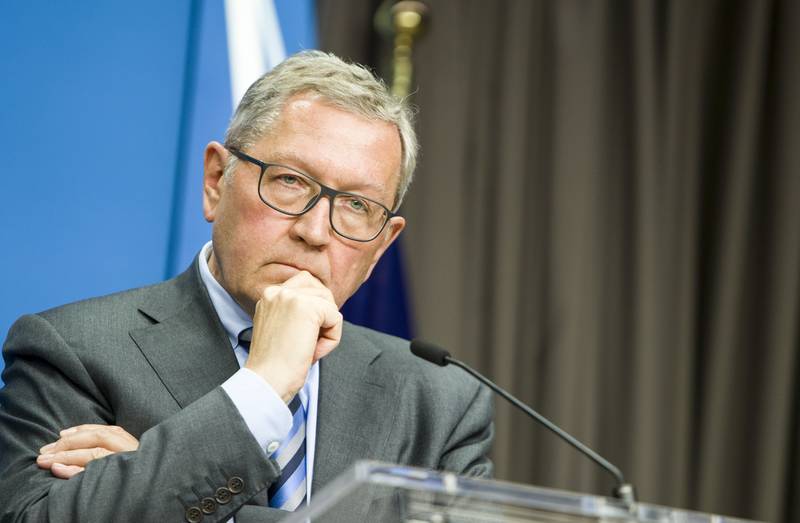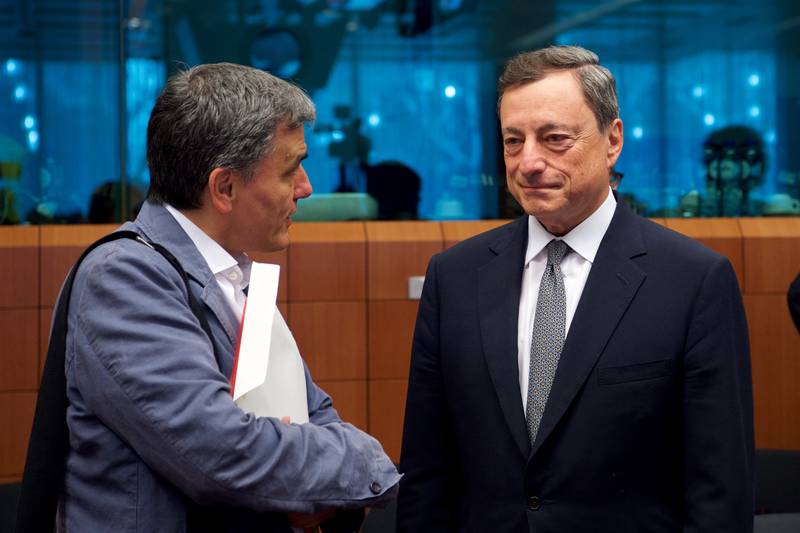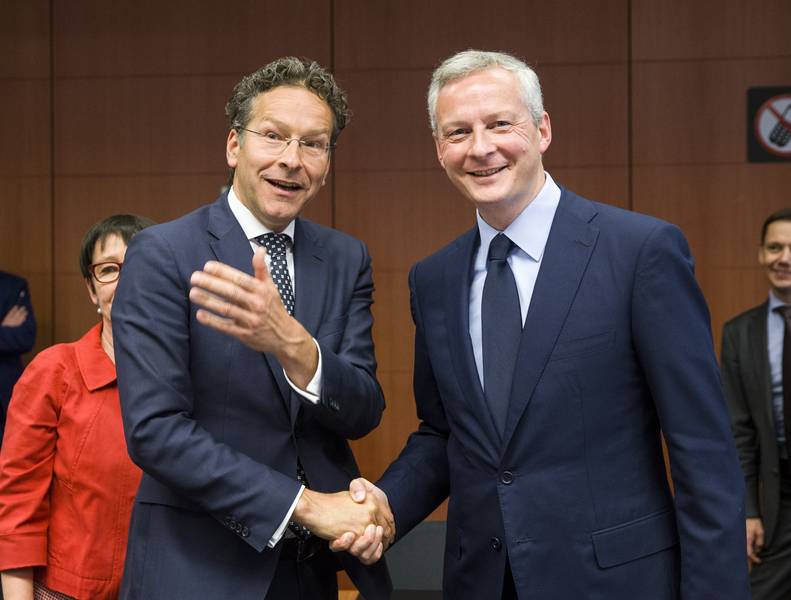Greece between IMF, German Elections, and the Future of the Euro Area
Adelina Marini, May 29, 2017

Disappointment flowed from the Eurogroup meeting on Monday of last week (May 22nd), when there was high expectation that an agreement with the International Monetary Fund would finally be reached on the issue of the Greek debt relief. After lengthy and painful negotiations, the meeting ended around midnight without a deal. And if so far there was no pressure to close the talks quickly to secure the next tranche, or Greece would go bankrupt, time is now coming in as a key factor, for the next tranche needs to be paid in July.
What is the problem?
The third rescue programme for Greece was agreed in the summer of 2015 in the hope that the IMF will re-engage with financial and expert involvement, as in the previous two programmes. However, the Fund refused to participate until the euro area made a specific commitment for debt relief. This has been the apple of discord for two years in a row now. Without the participation of the Fund, the € 86 billion program cannot be fully funded because of public opinion resistance in currency club member states. As the German Finance Minister Wolfgang Schäuble said in the summer of 2015, without the IMF there will be no third rescue programme.
A third bailout programme does however exist, and at this time last year an agreement was reached with the Fund that, after the completion of the second program review, there will be specific talks on what measures are euro area countries willing to offer to alleviate the Greek debt. Only, in the text of the statement, the euro area states insisted on writing "if necessary". The leaders of the institutions continue to insist on this “if”. The reason the IMF does not want to get involved is that it is not convinced that the Greek government debt is sustainable, nor does it believe the measures set out in the programme will make it sustainable. The programme pledges to achieve a primary budget surplus (excluding credit interest) in its final year (2018) of 3.5% of GDP and maintain this surplus over the medium term, which is a rather broad concept.
In February, the head of the Fund’s European department, Poul Thomsen, wrote a blog post entirely devoted to sovereign debt, detailing the Fund's position on the subject without mentioning Greece at all. "There are circumstances, however, where the government’s debt level is so high that it is “unsustainable”; that is, where the scheduled debt service exceeds the capacity of the member to service it, even taking into account both a strong adjustment program and significant financial support from the IMF. In these circumstances, it is not feasible - either politically or economically - for the problem to be solved through further belt tightening", says in the blog, and it is advisable to switch to debt restructuring in such a situation. "Indeed, a program that fails to address unsustainable debt is likely to exacerbate such problems because it will create further uncertainty regarding the member’s future", Poul Thomsen concluded.
Despite some twists and turns, the implementation of the third Greek program is coming to an end and is already giving its first results. Greece exceeded the targets for the primary budget surplus - instead of the expected 0.5% of GDP, in 2016 Greece scored more - 0.7%. This forced Poul Thomsen to recognise during the IMF and World Bank spring meetings that the IMF was wrong in its forecast for Greece. Nevertheless, the Fund remained adamant in its demand for concrete measures to make debt sustainable. The IMF acknowledges that one of the two conditions for its joining in in the Greek program is met - to undertake reform measures to ensure good economic  growth for Greece. The second condition for debt relief, however, is not fulfilled, as it became clear after the end of the Eurogroup on 22 May.
growth for Greece. The second condition for debt relief, however, is not fulfilled, as it became clear after the end of the Eurogroup on 22 May.
There is, however, a certain convergence of positions. The Eurogroup made a concession and set a period for a primary budget surplus of 3.5% - five years, which includes the final year of the program (2018). An agreement has also been reached on another thorny issue: Greece's gross financial needs (to finance debt and other fiscal and financial measures) should not exceed 15% of gross domestic product, reaching up to 20% in the medium term. There is no agreement, however, on what the euro area will do for the overall debt. Eurogroup boss Jeroen Dijsselbloem (the Netherlands, Socialists and Democrats) made it clear last Monday that if there is an agreement on the second review, debt talks will be opened.
"Very often it’s about finding the right balance between what people expect and what at this point could be made available", he said, hinting that the IMF should make a compromise. Greek Finance Minister Euclid Tsakalotos also called for compromises on both sides. The head of the European Stability Mechanism (the euro area's permanent rescue fund), Klaus Regling, however, recalled that Greece has already received unprecedented debt relief from private and public creditors. Private lenders, he said, agreed on the largest nominal haircut in history, and public creditors provided prolonged maturities and interest cuts, resulting in further debt reduction of 40%, Mr Regling said. According to the Commission's spring economic forecast, the Greek public debt will be 178.8% of GDP this year and 174.6% next year.
Long live information leaks!
Against the backdrop of US President Donald Trump's struggle with information leaks and recent publications in European media about a lack of transparency in the work of the Eurogroup, on Thursday, the Greek news site Europe2Day published minutes from the euro area ministers meeting on behalf of the European Commission. They clearly show the frustration of the euro area with the IMF's resilience. They also show how big the stakes are. Poul Thomsen said during the meeting that the IMF could live with the euro area's reluctance to cut the Greek debt on a nominal basis and with avoiding fiscal transfers, but longer maturities only would not be enough. "I am very far away from being able to tell our board that we are close to a strategy that we can agree to", says Mr Thomsen.
German Finance Minister Wolfgang Schäuble reminds the IMF that as early as 2010 the IMF agreed to the creation of a "big bazooka” of € 750 billion, 500 of which would come from the euro area and the other from the IMF. "Participation of IMF has been constitutional part of the programme always and without that I would have to negotiate a new programme and that would fail", says Mr Schäuble. His Austrian counterpart, Hans Jörg Schelling, goes even further: "We need to decide are you coming on board or not? Cannot be discussing new measures every four weeks", he said, and proposed to Poul Thomsen a wager: "If the Commission is right, you pay double what was expected? If you are right you pay nothing because you are not on board. We can make this bet but you will lose", were his words as described in the EC minutes.
Spanish Finance Minister Luis de Guindos is also sharp: "You cannot be 50% pregnant and IMF seems to be that now." Everyone hopes that an agreement will be reached by the next Eurogroup meeting on 15 June, but to the German finance minister the May meeting was a complete failure. The situation is particularly difficult for Greece, which has undergone really serious cataclysms, some of which being its own fault, but is already performing on its part of the deal. The problem is that its problems are too long-term. No one is inclined to bet that Greece will, in the long run, continue to follow the path of reforms and will not go back as it did with the coming of power of Alexis Tsipras in early 2015.
Lack of confidence in the euro area is one of the main reasons for ministers' reluctance to offer debt relief. According to some of them, especially Germany and the Netherlands, nominal debt haircut will have a demoralising effect on Greece and will stop reforms, which in turn will have a demoralising effect on other member states of the currency club with large debts. This mistrust is also the reason not to rush to deepen integration in the euro area. Greece is at another crossroads at the moment. On the one  hand, an agreement must be reached with the IMF, and this agreement must be such as to avoid causing trouble before the parliamentary elections in Germany in the autumn.
hand, an agreement must be reached with the IMF, and this agreement must be such as to avoid causing trouble before the parliamentary elections in Germany in the autumn.
There were talks around the Eurogroup meeting that there had been suggestions for the debt relief decision to be made after the German elections, but there is no such talk in the leaked minutes. In Greece, however, the topic is being discussed and such proposals are being made. On the other hand, the election of Emmanuel Macron as president of France has again started intensive talks about euro area reform to deepen integration. Mr Macron's ideas were initially taken with reservation in Berlin, but after his meeting with Angela Merkel moods changed. The finance ministers of both countries - Wolfgang Schäuble and Bruno Le Maire - have already set up a workgroup on this topic.
After his debut in the Eurogroup, Mr Le Maire talked mainly about how efforts are being made to bring Berlin and Paris closer together on key subjects. France still needs to show that it is able to implement reforms, but if that happens, then the process can be accelerated. Until then, it should be clear how will Greece fit in this context. In the short term, however, the most important thing is to reach an agreement on 15 June to secure the payment of the July tranche of EUR 7.3 billion. Otherwise, it may be that all previous efforts will go to the wind.
Translated by Stanimir Stoev
 Klaus Regling | © Council of the EU
Klaus Regling | © Council of the EU Mario Centeno | © Council of the EU
Mario Centeno | © Council of the EU Mario Centeno | © Council of the EU
Mario Centeno | © Council of the EU